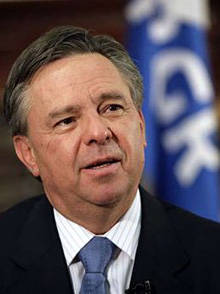
|  |  |  News Around the Republic of Mexico | September 2009 News Around the Republic of Mexico | September 2009  
Mexico Replaces Attorney General as Drug Violence Soars
 José de Córdoba - WSJ José de Córdoba - WSJ
go to original
September 08, 2009


| | Mexico's Attorney General Eduardo Medina Mora speaks at the Reuters Summit in Mexico City in this file photo from May 6, 2009. Mexico's President Felipe Calderon removed Medina, who had spearheaded the government's anti-drug campaign that has so far failed to defeat powerful cartels, on September 7, 2009. Calderon told reporters that Medina had resigned and would be replaced by former law enforcement official Arturo Chavez. (Reuters/Daniel Aguilar) |  |
Mexico City - President Felipe Calderón on Monday replaced his longtime attorney general, one of the key figures in his government's effort to bring Mexico's powerful drug cartels to heel, as the country's drug violence continues to spiral.

In a short speech, Mr. Calderón said Arturo Chávez, a former attorney general of northern Chihuahua state, was replacing Attorney General Eduardo Medina Mora. Chihuahua's largest city, Ciudad Juárez, has become the epicenter of Mexico's drug violence. Just last week, gunmen took over a drug rehabilitation center there and executed 18 patients, marking a new and grisly milestone in the country's drug violence.

Mr. Calderón also announced changes at the agriculture ministry and at state oil company Pemex. Mr. Calderón named former Pemex Chief Financial Officer Juan José Suárez Coppel as the company's new chief executive, taking over from Jesús Reyes Heroles, a former energy minister. Mr. Suárez Coppel takes the reins at a tough time for the oil giant: Output has fallen to 2.5 million barrels a day from a peak of 3.4 million in 2004 amid a dramatic decline in output from Mexico's main oil field, Cantarell.

The changes come as Mr. Calderón tries to regain political traction following July midterm legislative elections in which his center-right National Action Party suffered a major defeat to the opposition Institutional Revolutionary Party, which now has the most seats in the lower house of Congress.

Since coming to power in 2006, Mr. Calderón has made the fight against Mexico's warring cartels the centerpiece of his policy. He has deployed an estimated 40,000 soldiers to cities like Ciudad Juárez to take on the drug gangs, using soldiers instead of often-corrupt local police.

More than 13,000 people have died since Mr. Calderon took office, according to newspaper estimates, most victims of internecine warfare between drug cartels fighting over drug routes to the U.S. and increasingly lucrative Mexican drug markets.

Mr. Medina Mora's departure is a boost for Public Security Minister Genaro García Luna: The two men had clashed over Mr. García Luna's plans to create a single national police force under his command. Mexico's Congress killed that plan, but Mr. García Luna has begun creating a de facto national police, his new Federal Police force.

"This shows beyond any doubt that Mr. García Luna is the one driving the drug-war policy and is closest to Mr. Calderón's beliefs and ideas," said Guillermo Zepeda, a criminal justice specialist at Mexico's Center for Development Studies, a think tank.

Mr. Medina Mora, a corporate lawyer, had been attorney general for the last three years. During the previous administration, he served as head of the CISEN, Mexico's equivalent of the U.S.'s Central Intelligence Agency. Mr. Calderón said Mr. Medina Mora will continue to serve Mexico in a diplomatic post. Mr. Medina Mora is expected to be named Mexico's ambassador to the U.K., people familiar with the situation say.

Mr. Medina Mora posted some victories, such as the capture of an alleged methamphetamine dealer together with a record stash of $207 million in cash. Mr. Medina Mora also extradited a record number of alleged drug traffickers to the U.S.

But a year ago, his office was shaken by scandal when it was revealed that several top members of the attorney general's office's antidrug unit had been on the payroll of one of Mexico's most powerful drug gangs. Neither Mr. Medina Mora nor Mr. García Luna have been to recapture an alleged top drug dealer, Joaquín "El Chapo" Guzmán.

Mr. Chávez, a member of Mr. Calderón's center-right National Action Party, was Chihuahua's attorney general from 1996 to 1998. Jorge Montaño, a former ambassador to the U.S. and a native of Chihuahua, said Mr. Chávez did a good job, but lamented that the president hadn't reached out beyond the ranks of the PAN. "It's all the same gang," he said.

David Luhnow contributed to this article.

Write to José de Córdoba at jose.decordoba(at)wsj.com |

 |
|  |



